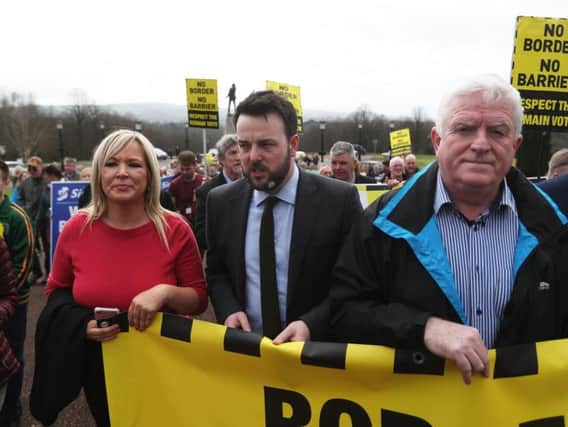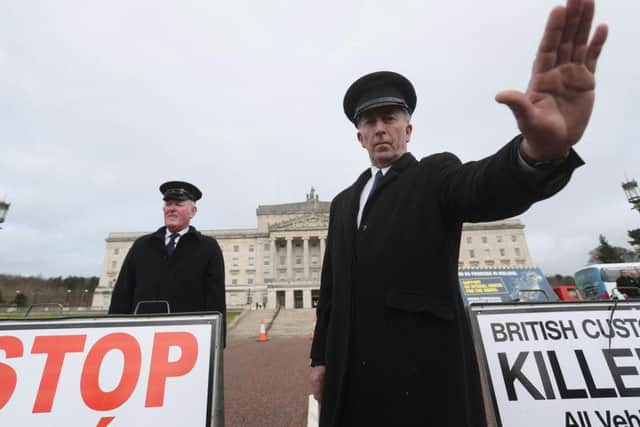Anti-Brexit campaigners march on Stormont amid concerns of 'hard' Irish Border


The demonstration included the erection of mock customs checkpoints to highlight fears about a hardening of the Irish border when the UK leaves the EU.
The 300-strong protest came amid a political crisis at Stormont that has left the region without a devolved government as the Brexit process formally commenced.
Advertisement
Hide AdAdvertisement
Hide AdThey chanted "no borders, no barriers, no Brexit" as they made their way up the landmark main avenue to the steps of Parliament Buildings.


While Sinn Fein and the SDLP joined the colourful picket, elsewhere unionists welcomed the triggering of article 50.
The majority of voters in Northern Ireland backed Remain - 56% to 44%.
The Stormont march was organised by campaign group Border Communities Against Brexit.
Advertisement
Hide AdAdvertisement
Hide AdSpokesman Declan Fearon told the crowds Prime Minister Theresa May was not interested in their concerns.


"It seems she simply doesn't care, maybe doesn't know what the full implications are for the people who live along the border," he claimed.
"Our population here is less than 3% of the UK so it seems we don't matter when the bigger decisions are being made, especially those concerning Brexit."
He added: "It is not acceptable that we are being squeezed between two enormous political forces in the British government and the European Union with large macro economies while we are located on the edge of Europe faced with the prospect of our borders being closed and having to pay tariffs on our goods with inevitable long delays on our border crossings."
Advertisement
Hide AdAdvertisement
Hide AdMr Fearon said Brexit was "bad news" for people in Ireland whether they were unionist or nationalist.
"We must show to the British and Irish governments and indeed especially to the European Union that we are not going to stand by while our island and our economy is devastated and divided by Brexit," he said.
Earlier, Sinn Fein said its campaign to secure special designated status for Northern Ireland post-Brexit was building momentum across Europe.
The republican party's Stormont leader Michelle O'Neill, who attended the protest, dismissed the notion that such a concession would be unachievable in the forthcoming negotiations.
Advertisement
Hide AdAdvertisement
Hide Ad"Brexit would be a disaster for Ireland, socially, politically and economically," said Mrs O'Neill.
"It is unacceptable that Tories, who have no mandate in Ireland, can impose Brexit and a border against our will.
"The people of the north voted against Brexit in a democratic poll."
She added: "Clearly we need special status - we are building momentum and that argument is resonating across Europe."
Advertisement
Hide AdAdvertisement
Hide AdMrs O'Neill said the Irish government needed to "step up" and ensure special status was secured in the Brexit negotiations.
DUP deputy leader Nigel Dodds struck a very different tone during Prime Minister's Questions in the House of Commons.
"The Prime Minister has rightly been emphasising her determination to deliver for all constituent parts of the United Kingdom on this historic day," he said.
"And whilst others are content to moan and whine we want to see that delivery happen and we are confident she will make that happen."
Advertisement
Hide AdAdvertisement
Hide AdThe Ulster Unionists campaigned for Remain but, since the result, the party has voiced support for the referendum result to be actioned.
UUP MP Danny Kinahan told the Commons: "May I congratulate the Prime Minister and the Government on today triggering Article 50.
"I know this a momentous action for the whole of the United Kingdom.
"And while I, like herself, campaigned to stay in, we recognise that the people have spoken and we offer, the Ulster Unionist Party, full support in ensuring that negotiations deliver the best for the whole of the United Kingdom and particularly for Northern Ireland."
Advertisement
Hide AdAdvertisement
Hide AdSDLP leader Colum Eastwood, who also participated in the demo, said triggering Article 50 when Northern Ireland had no powersharing executive in place was an act of "democratic savagery".
"The British government's Brexit juggernaut is about to smash through the fragile complexities of Irish politics," he said.